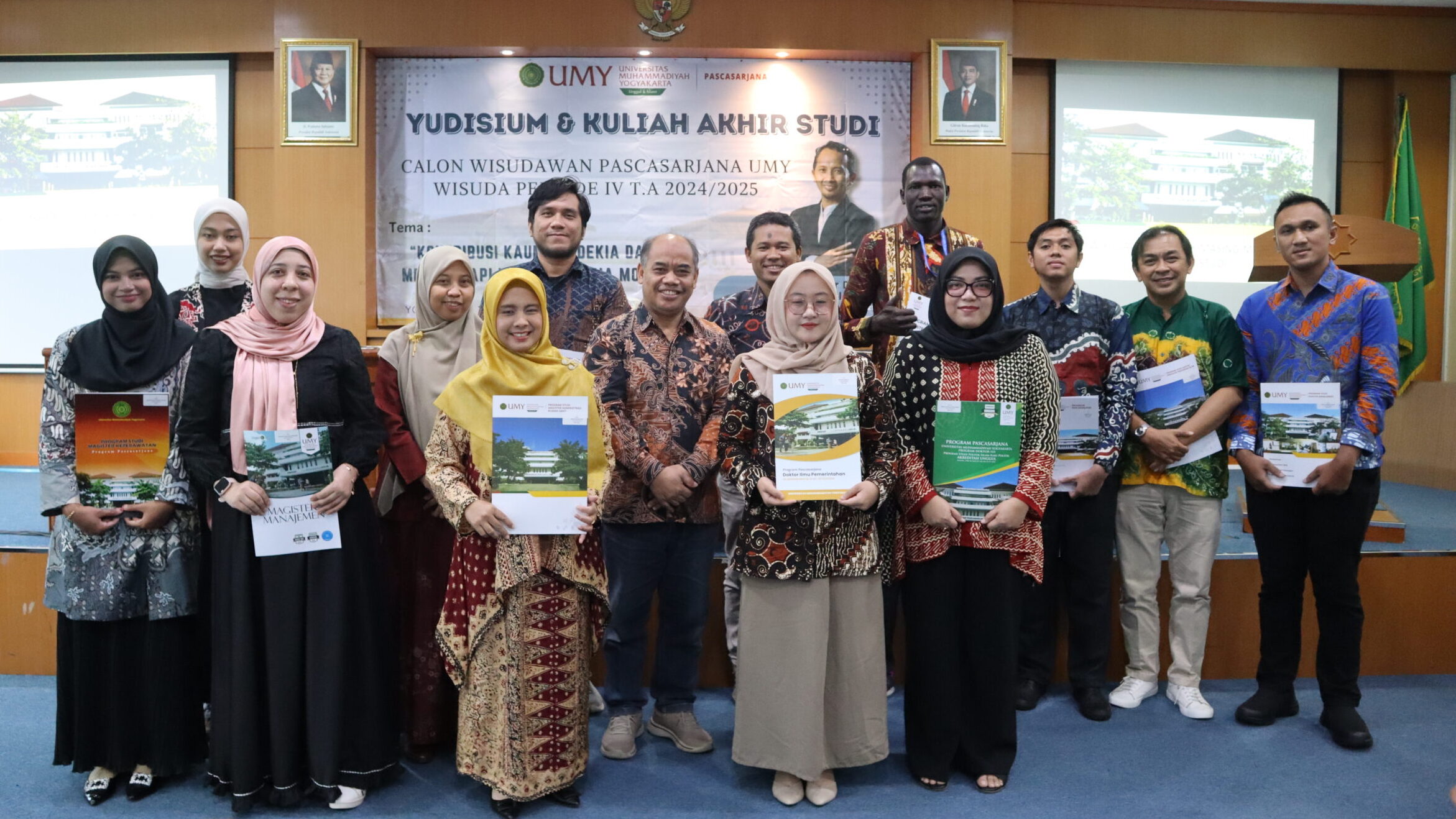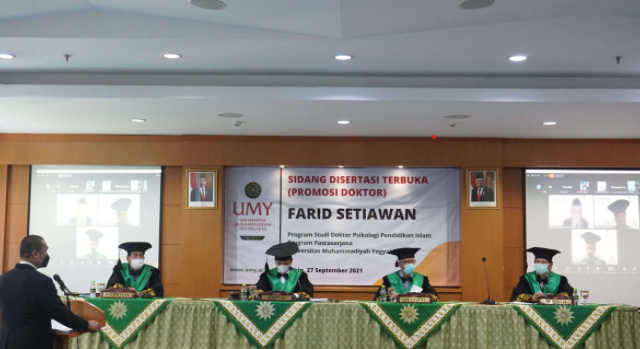

As reported on the official website of the Doctoral Program in Islamic Educational Psychology, Universitas Muhammadiyah Yogyakarta (UMY), the Doctoral Program in Islamic Educational Psychology (PPI) of Universitas Muhammadiyah Yogyakarta (UMY) once again held a Doctoral Promotion Session for Farid Setiawan on Monday (27/09). This event was conducted in a blended format, combining online and offline. The offline session was held in the 4th-floor Amphitheater of the UMY Postgraduate Building, while the online session used Zoom Meeting.
Farid Setiawan’s dissertation is titled “Leadership Characters According to Ki Bagus Hadikusuma and Sukarno: A Psychological Perspective”. In his dissertation, Farid researched the leadership characters and styles of both figures. This research employed a library research method, using primary sources such as writings by Ki Bagus and Sukarno, as well as secondary sources like authoritative references discussing the journeys of these two figures.
The motivation behind studying these two figures stemmed from the author’s desire to trace the thoughts of these figures in laying the foundation of the nation, to understand their perspectives, leadership characters, and styles. According to Farid, these two figures were interesting to study because Ki Bagus Hadikusuma and Sukarno were successful leaders in their time, and both were included in the list of 100 people who changed Indonesia. Furthermore, the legacy they left behind, namely Pancasila, is very meaningful, especially regarding the role of both figures in formulating Pancasila. Finally, both figures paid serious attention to the importance of a leader’s character and style. For these reasons, research on these two figures is considered very important, as their futuristic thinking remains relevant today.
The first finding obtained by the doctoral candidate was regarding the thought of leadership characters. There was a contrasting difference between Ki Bagus Hadikusuma and Sukarno. These differences were influenced by many factors such as family background, education (including reading materials), and the social environment. Ki Bagus emphasized a prophetic leadership paradigm, a paradigm that prioritizes moral-religious principles. This can be evidenced by the eight characters of a leader that he formulated, such as istiqamah, tawakkal, muhasabah and muraqabah, justice and honesty, humility and not arrogance, keeping promises, patience and calmness, and living simply. Meanwhile, Sukarno had a psychological paradigm of political leadership, meaning that Sukarno emphasized rational-political principles. According to him, a leader must have ten characters: visionary, enthusiastic, creative, flexible, inspirational, innovative, courageous, imaginative, not experimental, and independent.
The next finding was about leadership styles. Ki Bagus was known as a charismatic-democratic figure because he was always seen as a role model and a place of consultation for many people, including Sukarno. Moreover, he often held the final decision-making key in many important moments. Meanwhile, Sukarno was known as charismatic-authoritarian. His charisma was evident in his intellectual capacity, his ability to formulate words incredibly well, as well as his provocative-agitative language and body language, earning him the nickname “Lion of the Podium”. His authoritarian side could be seen in his centralized leadership character, which was especially prominent during the guided democracy period.
Looking at the two differences presented by the author, it is clear that the two were very contrasting, but there was a very significant similarity, namely the similarity of both figures in the matter of national unity. The involvement of both figures was central in the formulation of Pancasila. Ki Bagus, as a representative of the nationalist-religious group, and Sukarno, from the nationalist-secular group, could unite in agreeing on Pancasila as the state ideology. They even had nicknames in this formulation process, Sukarno as the excavator of Pancasila and Ki Bagus as the final key holder in the establishment of Pancasila.
“Through this dissertation, I am trying to promote the idea that the existence of charismatic figures and leaders is needed as a calming influence in society, serving as a big tent, an example, and a place of consultation. Another aspect is the democratic aspect of leadership; humans are given two ears and one mouth so that they can listen more than they speak,” explained Farid.
Today’s Doctoral Promotion Session went well, orderly, and smoothly. Finally, the doctoral candidate, Farid Setiawan, successfully graduated with honors. The Examination Committee consisted of Ir. Sri Atmaja P. Rosyidi, Ph.D. as Chair of the Session, M. Syifa Amin Widigdo, Ph.D. as Secretary of the Session, Prof. Dr. Siswanto Masruri, M.A. as Promotor, Dr. Tasman Hamami, M.A. as Co-Promotor, Prof. Sjafri Sairin, M.A., Ph.D., Dr. Ir. Gunawan Budiyanto, M.P., IPM, Dr. Abd. Madjid, M.Ag, and Prof. Hilman Latief, M.A., Ph.D. as Main Examiners. With the completion of this promotion session, doctoral candidate Farid Setiawan has officially become a doctor in the field of Islamic Educational Psychology, and the 107th doctor to be produced by PPI UMY. (swtzl)